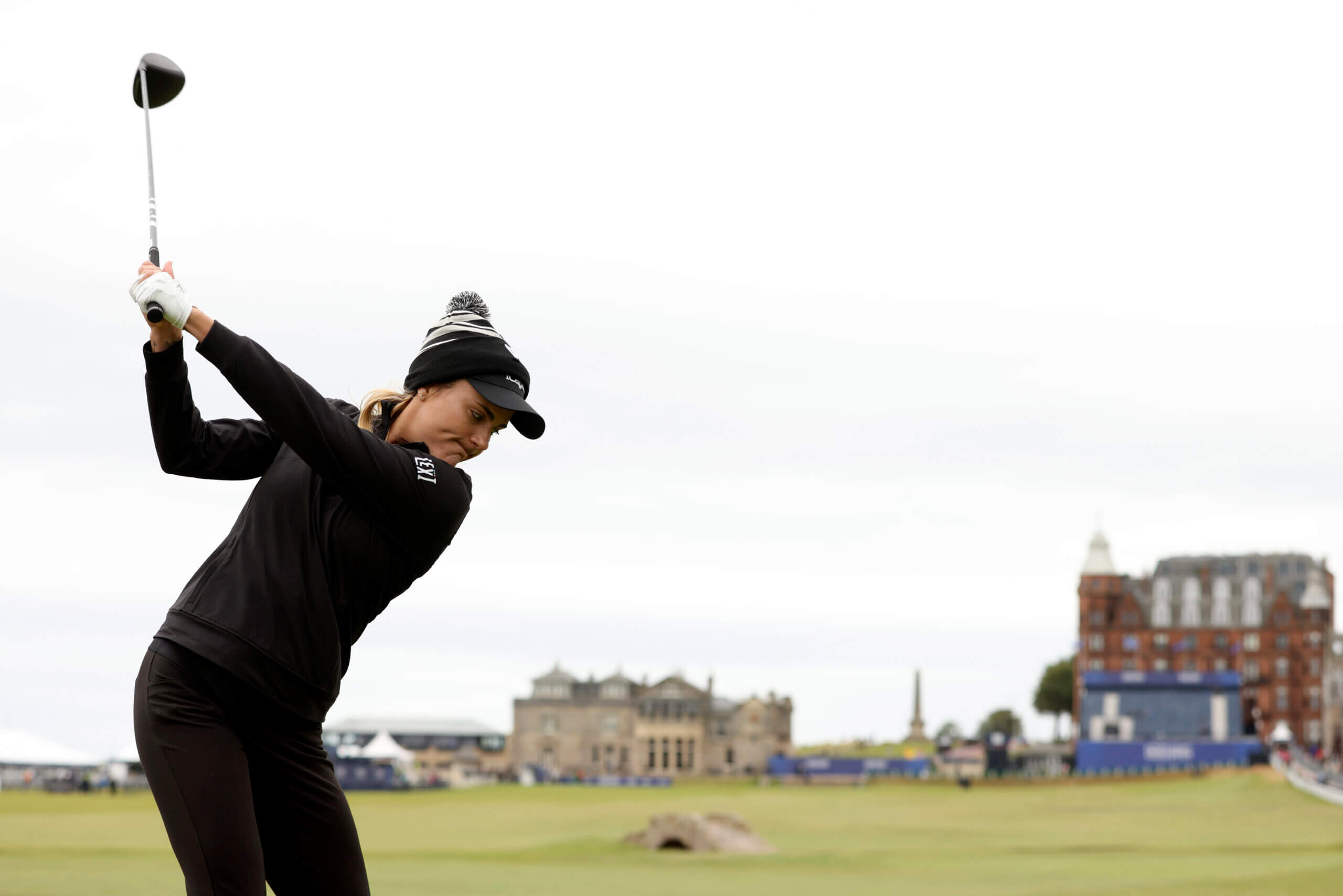ST. ANDREWS, Scotland — Stacy Lewis is back sitting at the top table of the media room, answering a belated question from someone too shy to shout over the gusts of wind during the press conference.
Her five-year-old daughter Chesnee wants to know if she can get a swimming pool — “a big one” — if her mum wins here, as she did in 2013.
“I think I might be able to sort you out, girlie,” says Lewis.
Eleven years have passed since the Texan shot birdie-birdie on the final two holes to clinch the Women’s Open by two shots. The second shot into 17 remains the best of her career, so much so that the 5-iron is the only club she has kept for her office.
But in that time, as motherhood has usurped golf in her list of priorities and made her less tunnel-visioned, the demands of the LPGA Tour have become even more all-consuming.
This year’s tour started with two Florida events and ends with another three in the Sunshine State. The intervening 10 months? A map of tangled zig-zags across the United States, Canada, Europe and Asia that would not look out of place in Chesnee’s school jotter.
This week’s Open is the fifth major in as many months, not including the Olympic Games at France’s Le Golf National earlier this month. St. Andrews closes the majors season, but with the Solheim Cup in September and another Pacific leg this fall visiting China, South Korea, Malaysia, Japan and Hawaii in the space of just 35 days, the schedule is rammed and not ending anytime soon.
We only ask the most important questions in this press conference!!!
Chesnee asked mom @Stacy_Lewis if she could get a swimming pool
pic.twitter.com/bhqgapR1Yz
— LPGA (@LPGA) August 21, 2024
Across the 33 combined LPGA Tour stops and majors this year, there are more than 215 hours of pure flying time. The overall mileage adds up to more than three trips around the world.
This is not a new problem — last year’s schedule included a record-breaking 18 occasions with more than 2,000 miles between tour stops. This season there was the travel to China and intra-continental visits to Thailand and Malaysia; criss-crossing from west coast Los Angeles to east coast New Jersey in May; June’s see-sawing from Michigan to the PGA Championship in Washington state and back again to Michigan, two six-hour flights with just four days rest in between each.
Eight-and-a-half months into the season, with winds of 40-45 mph forecast for Thursday and many players having not been able to play the Scottish Open to reacquaint themselves with links golf, can it be expected that any player is at the top of their game? “Probably not, no,” said Lewis, who is Team USA’s captain for the Solheim Cup in Virginia next month. “Those who played the Olympics, you talk to most of them and it’s just emotionally so taxing that week. So no, our schedule, especially Olympic years, is really, really tough.
“There’s been a lot of talk of schedule lately but also at the same time, I’ve been doing this for 15 or 16 years. You learn how to deal with it, and you learn how to be ready in those moments and really just do the best you can.”

GO DEEPER
The Women’s Open is at St. Andrews. The Old Course is ready to challenge the field
Since 2009, the purse at the Women’s Open has increased from $2.2 million to $9 million, a 409 per cent increase — tripling since AIG started sponsoring the tournament in 2020.
Lewis described the improvement in infrastructure and facilities at the Women’s Open as “night and day” compared to 2013 but believes their hands are tied when it comes to finding ways to ease the gruelling schedule.
“I think that’s the ideal but a lot of it is when do sponsors want to play and when do we get the golf courses?” she said.
“We don’t have the luxury of the PGA Tour that says, ‘We’re giving you X amount of dollars and we’re playing this week.’ We don’t have the money to just throw around.
“We are kind of at the mercy of sponsors. We are at the mercy of golf courses and it’s the nature of where we are. Would we like to be better? Yeah, absolutely. I think our team behind the scenes works like crazy on it but we’re a global tour, and I want to compete against the best players every week.
“So to do that, we’ve got to go play in Thailand because we have players from Thailand. We’re going to go play in Korea because we have players from Korea. I think that’s just the nature of it. It’s more getting into your head, to me, that this is a global tour. You say you’re going to go play on the LPGA Tour, this is also what you signed up for.”
World number one Nelly Korda, having won six tournaments in seven starts between January and May, including the Chevron Championship, has earned more than $3 million this year in prize money.
That allows her the luxury of skipping the full Asia swing, a seven-week lay-off early in the year that was sandwiched between her winning streak. But even the two-time major winner had to withdraw from the JM Eagle LA Championship in April, citing exhaustion.

Nelly Korda has taken frequent weeks off this season, a luxury not all LPGA pros can afford. (Michael Reaves / Getty Images)
Lexi Thompson opened up the conversation around the mental and physical demands of the LPGA Tour in May when she announced she was retiring at the end of the season, aged just 29.
She spoke about how “lonely” and all-consuming life on tour has been since she qualified for her first U.S. Open at 12 but believes there are ways the load could be lessened.
“The schedule for sure,” said Thompson. “I think all the travel gets a lot. I think the flow of schedule could be better. Certain events could be back-to-back that are close to each other. We travel a lot out of the country but it is a global tour so that comes with it, and we’re very lucky for the sponsors that we have outside the country.
“There is a little less weight on my shoulders after the announcement because it has been on my mind for a few years, so it’s something that’s been inside that nobody really knew about or what was going to happen.”
Catriona Matthew claimed her only major at the Open in 2009, winning at Royal Lytham & St Annes just 11 weeks after giving birth. Now 54 years old and making her last appearance at her home tournament, Matthew does not know how she managed to tour with her two children in the following years.
To keep chasing another major in a field so deep Lewis counts 60 per cent as having the potential to win requires supreme resilience.
Lydia Ko is looking to end an eight-and-a-half-year major drought this week but the Australian comes in hot after winning gold in Paris, becoming the 35th woman to be inducted into the LPGA Hall of Fame.
She remains the youngest female to ever win on the LPGA Tour after her triumph at 15 years old, but 12 years later there was an immediate dose of realism about how long she is willing to overcome the sore backs she experiences in the morning — and whether she may bring forward her planned retirement at 30.
“In ways, it can be scary because I’ve played golf since I was five,” said Ko.
“This is my life whether I like it or not and golf has given me so much for me to be thankful for on and off the golf course.
“As much as we are very grateful to be able to do what we love and compete at a high level, I think there is the other side of things that you have to consider. As someone that’s maybe closer to that point in my career than when I was a rookie, you come to realise all of these things, and you respect the player for the decision that she came up with.”
There are players still determined to join the majors club, most notably England’s Charley Hull whose attitude towards a recent shoulder injury captures the mindset needed to cope with this relentless schedule.
“My shoulder just got a little bit tight so I have acupuncture in it every other day because when it’s cold, it can play up a bit,” she said.
“I’ve got degenerate arthritis in it, as well. So when it does get cold, it gets a bit stiff. I just try to keep it warm.
“Apart from that, I’m healthy and ready to go.”
(Top photo: Luke Walker / Getty Images)






